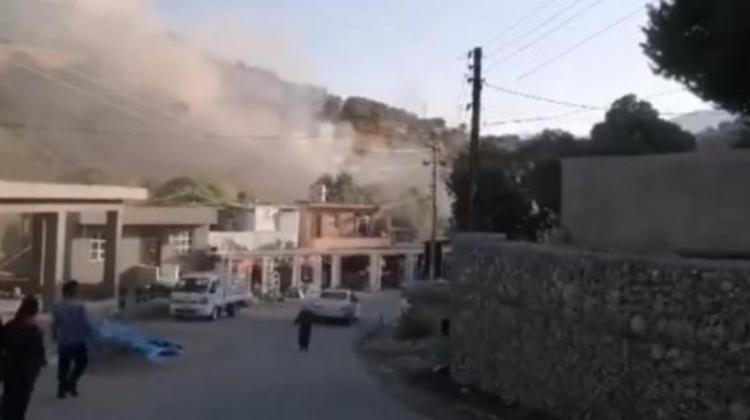Turkish incursion in Iraqi Kurdistan part of neo-Ottoman dream: US Kurdish Studies Specialist
The current Turkish incursion into the Kurdistan Region of Iraq (KRG) could not be curbed, though it has been condemned by many regional powers in the Middle East and organizations all over the world, American global conflict analyst and Kurdish studies specialist Dr. Thoreau Redcrow told North-Press in an interview on Sunday.
Redcrow said that though the Turkish operations known as Operation Claw-Eagle and Claw-Tiger have been condemned by the US Commission on International Religious Freedom, three US legislators, the Arab League, Egypt, and Iraq, but “such condemnations are mostly hollow.”
Though both the Parliament of the KRG and Iraq condemned the operations, according to Redcrow, “Turkey is constructing dozens of new bases throughout [the KRG] which would only be possible with KRG permission.”
“Likewise, Turkey is carrying out these attacks with US weaponry supplied by NATO. And, Turkey’s MIT [intelligence services] head Hakan Fidan visited Baghdad a few weeks ago, likely to get approval for it,” he said.
Redcrow further pointed out that Egypt may be one of the only regional allies worthy of the Kurds’ trust, as they “do not fear Turkey and are opposing Turkey’s attempts to convert Libya into their own puppet state, and prop up jihadists in Idlib.”
Egypt’s condemnations echo this statement; recently the Egyptian Ministry of Foreign Affairs issued a statement harshly condemning the Turkish operations in the KRG and Northern Iraq.
“The repetition of such aggressive practices shows the reality that Turkey intends to impose on all, which proves what Egypt has repeatedly said as Turkey is a major source of instability in the region,” the statement read.
According to a tweet from the Turkish Defense Ministry, Operations Claw-Eagle and Claw-Tiger are “being carried out within the framework of our legitimate self-defense rights arising from international law for PKK and other terrorist elements.”
The PKK, or Kurdistan Workers’ Party, is a political and militant organization in conflict with the Turkish state since the 1980s.
The PKK is based in northern Iraq, notably in the mountainous Qandil region within the KRG. Ankara said the operation aimed to destroy shelters and caves used by the PKK and “neutralize” its members – a term it commonly uses to refer to deaths, but also to those wounded or captured.
However, many videos have surfaced of Turkish aircraft attacking civilian targets, including one which allegedly shows a family with young children playing in a river in Kuna Masi, north of Sulaymaniyah, when a Turkish bomb falls just meters away.
Another video aired on the KRG-based Rudaw network features a civilian from the northern KRG city of Sheladize stating, “there is no PKK in the vicinity of our villages and areas."
“Turkey has never needed the existence of actual PKK to justify war crimes against the Kurds,” Redcrow told North Press when asked about the reasons behind the operations.
“These operations play an important psychological role for the Turkish nationalist psyche, regardless of their effectiveness. They also have the added benefit of distracting from the domestic failings of the government, as people do not want to criticize the nation during a time of war,” he added.
“You can go back and look at a timeline of the falling Turkish lira and economy and directly track it to invasions of [North and East Syria], attacks on the PKK, occupations of [KRG], etc.”
Furthermore, Redcrow sees the current operations as part of what he considers Turkish President Recep Tayyip Erdogan’s dream of Ottoman-style expansionism.
“He believes that all of [North and East Syria] and [the KRG] are essentially Turkish lands,” he said.
“Erdogan’s government believes that cities like Aleppo, Mosul, and Kirkuk (with all its oil) are theirs and can be reclaimed, in a similar way to how Hatay was stolen from Syria in 1938, Northern Cyprus was occupied and stolen in 1974, and Afrin was occupied in 2018,” he added, recalling similar times and situations in which Turkey annexed foreign territories.
“The past is prologue, and there is very little that is new in how Turkey’s military is behaving,” he said of the current operations.
The Turkish military launched what it dubbed “Operation Claw” in northern Iraq’s Hakurk region on June 27 with artillery and air strikes followed by operations by commando brigades.
Turkey’s pro-Kurdish Peoples’ Democratic Party (HDP), the third largest in parliament, has said such operations create crises and that dozens of similar operations in the past have not produced a solution.
(reporting by Lucas Chapman, editing by Hisham Arafat)

